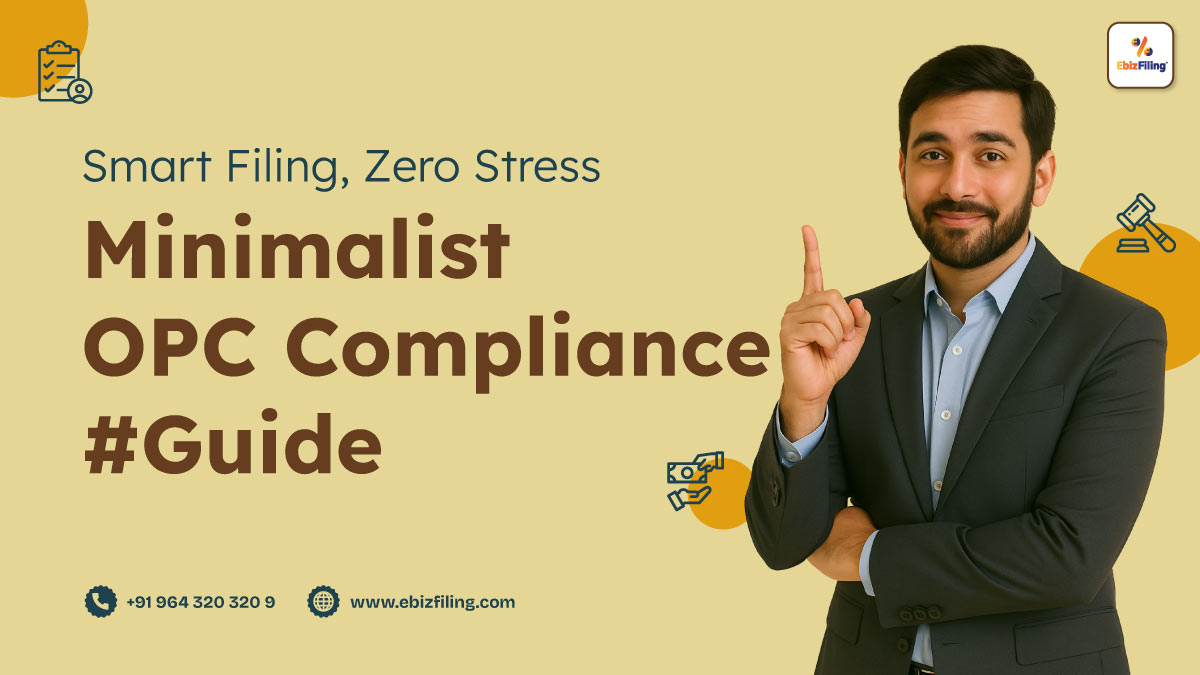
-
September 22, 2025
-
ByDhruvi D
Minimalist Compliance Strategy for OPCs
Introduction
This Minimalist OPC Annual Compliance strategy focuses on fulfilling only the essential compliance requirements needed to run a One-Person Company efficiently. This approach reduces unnecessary burdens by prioritizing strategic tasks, using digital tools to streamline filings, and avoiding penalties, effectively helping busy OPC founders file smart, not hard.
Summary sections
- Minimalist compliance guarantees OPC founders stress-free and on-time filing.
- Streamlined audit processes avoid unnecessary document handling.
- Pre-validation checks forms for errors before filing.
- OPC owners are informed of all deadlines through calendar reminders.
- Filing smartly reduces compliance costs significantly.
- Perfect for solo entrepreneurs who prioritize expansion over paperwork.
Why OPCs Need a Minimalist Compliance Strategy
To assist solo entrepreneurs, One Person Companies (OPCs) emerged. Founders frequently neglect OPC Annual compliance filings because of their workload, which results in fines and compliance gaps even with the bare minimum requirements. A minimalist strategy:
- Keeps compliance simple, clear, and structured.
- Saves time spent on multiple follow-ups with professionals.
- Reduces expenses by avoiding resubmission and late fees.
- Guarantees that no essential documents are overlooked, safeguarding the business’s legal standing.
Quick Annual Compliance Summary for an OPC in India
|
Compliance Task |
Due Date / Trigger |
|
AOC-4 Filing |
Within 180 days from financial year-end |
|
MGT-7A Filing |
Within 60 days of AGM/due date |
|
DIR-3 KYC |
30th September each year |
|
ITR Filing |
By 31st October (if no audit required) |
|
Audit Requirement |
If Turnover > ₹2 Cr or Capital > ₹50 Lakh |
Minimalist Compliance Strategy for OPCs
This strategy simplifies OPC Annual compliance by combining financial statements preparation, annual return filing, and tax compliance systematically.
Streamlined Annual Compliance Process
- Prepare financial statements early: Finalize financials soon after year-end to avoid audit delays.
- File AOC-4: Submit financial statements within 180 days from financial year-end.
- File MGT-7A: Submit annual return within 60 days from AGM or due date for AGM.
- Complete DIR-3 KYC: Update Director KYC every year by 30th September.
- File Income Tax Return: Submit ITR by 31st October if audit is not required.
- Choose a single compliance partner: Engage one professional firm for all filings to avoid confusion.
- Combine related filings: Prepare MGT-7A and AOC-4 together to save time and effort.
Smart Audit Processes for OPCs
- Appoint your auditor early: If an audit is needed, make sure to appoint a Chartered Accountant within 30 days of starting your company. For future years, don’t delay the reappointment to stay on the safe side.
- Don’t leave books for year-end: Update your accounts every month—it’s easier to manage, helps avoid errors, and saves you a lot of stress at the end of the year.
- Quarterly checks help: Ask your accountant to validate your ledgers every quarter. Small corrections made early prevent big problems later.
- Stay organized: Keep all your invoices, bank statements, and other financial records neatly sorted. It makes audits smoother and keeps you ready for any checks
Pre-Validation of Compliance Forms
- It involves reviewing forms for errors, missing data, or format issues before filing.
- Ensures all technical and content requirements are met before submission.
- Prevents late filing fees due to corrections and re-uploads.
- Minimizes repeated work for your CA or CS, optimizing compliance costs.
- Verifies PAN, DIN, company name, and address details in advance.
- Results in faster approvals on MCA and Income Tax portals.
Effective Calendar Reminders and Compliance Tracking
- Mark key compliance dates with early and same-day reminders.
- Platforms like EbizFiling’s Compliance Dashboard integrate deadlines with document tracking.
- Choose firms offering WhatsApp or email compliance alerts monthly.
- Check upcoming due dates at the start of each month to plan filings efficiently.
- Schedule connected compliance activities together for time efficiency.
- Regular reminders ensure filings are done comfortably before deadlines.
Benefits of Filing Smart with a Minimalist Compliance Strategy
- Reduces unnecessary follow-ups and last-minute corrections.
- Avoids penalties, re-upload fees, and duplicated professional charges.
- Early preparation and pre-validation minimize filing errors.
- Frees up founder time for core operations and strategic decisions.
- Maintains continuous compliance and avoids MCA notices or disqualification risks.
Conclusion
A minimalist compliance strategy for OPCs helps founders file smart, not hard. With streamlined audits, pre-validation, and structured reminders, OPC Annual compliance becomes simple, cost-effective, and stress-free for your entrepreneurial journey. For seamless compliance, professional support from EbizFiling ensures every filing is accurate and timely.
Suggested Read :
OPC Compliance After Incorporation in India
Mandatory Compliance List for OPC (One Person Company) in India
Exemptions and Benefits for OPC Compliance
OPC vs Pvt Ltd Compliance: Who Files Less and Pays Fewer Penalties?
Understanding the OPC Turnover Limit for Small Businesses
FAQs
1. What is a minimalist compliance strategy for OPCs?
For OPCs, a minimalist compliance strategy concentrates on completing the bare minimum of regulatory requirements in an organized manner. By simplifying filings with digital tools and timely reminders, it helps founders avoid pointless tasks and penalties, in other words, filing smart, not hard.
2. Is an annual audit required of an OPC?
Yes, An audit is mandatory for every OPC every year, regardless of turnover or capital. The ₹2 crore turnover and ₹50 lakh capital limits apply only for conversion to Pvt Ltd, not for audit exemption.
3. How does pre-validation benefit OPC filings?
Pre-validation checks all forms for errors, missing data, or technical issues before submission. This avoids rejections, penalties, and re-uploading, ensuring faster compliance approvals.
4. Can OPC founders file annual returns themselves?
Technically yes, but it requires knowledge of MCA forms, company law deadlines, and document formats. Engaging professionals like ebizfiling ensures accuracy and avoids costly mistakes.
5. What are the main OPC Annual compliance filings every year?
The main OPC Annual compliance filings include AOC-4 for financial statements, MGT-7A for annual return, DIR-3 KYC for the director, and income tax return filing.
6. Is GST registration part of OPC minimalist compliance?
GST registration is required only if your OPC turnover crosses ₹20 lakh (₹10 lakh for special category states) or if you deal in inter-state supplies. It is not part of annual company law compliance but a separate indirect tax compliance.
7. What happens if OPC filings are delayed or missed?
Delayed filings attract penalties of ₹100 per day per form under the Companies Act, 2013, and repeated delays can impact the legal standing of your OPC.
8. Is hiring a single compliance partner beneficial for OPC founders?
Yes, having one trusted compliance partner like ebizfiling avoids miscommunication, ensures all tasks are managed systematically, and reduces overall compliance costs and time.
9. Does a minimalist compliance strategy affect the legal status of my OPC?
No, it actually strengthens your OPC’s legal status by ensuring all essential compliances are filed correctly and on time, without unnecessary delays or penalties that could otherwise impact your company’s credibility.
10. How can EbizFiling help with OPC compliance?
EbizFiling offers end-to-end OPC compliance services including annual filings, audits, and DIN KYC with timely reminders and expert support, helping founders file smart, not hard.
OPC Annual Filing
Ebizfiling Makes OPC Annual Filing Easy & smooth
About Ebizfiling -










January 20, 2026 By Steffy A
Federal and State E-File Program Introduction The modernized e-file system has changed how federal and state tax returns are filed in the United States.It allows taxpayers and professionals to submit returns online using a secure IRS platform. […]
January 20, 2026 By Bhakti S
Free LLC Formation: How to Start an LLC for Free With State Fees Introduction The idea of starting a business without paying anything upfront sounds attractive. That is why phrases like free LLC formation and start an LLC for […]
January 20, 2026 By Dhruvi D
What Do You Need to Know to Open a Merchant Account? Introduction Many businesses rush into accepting card payments without fully understanding what a merchant account is. This often leads to rejected applications, delayed activations, or frozen funds later. […]